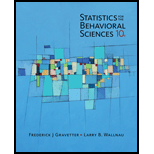
Recent research suggests that the amount of time that parents spend talking about numbers can have a big impact on the mathematical development of their children (Levine, Suriyakham, Rowe, Huttenlocher, & Gunderson, 2010). In the study, the researchers visited the children's homes between the ages of 14 and 30 months and recorded the amount of "number talk" they heard from the children's parents. The researchers then tested the children's knowledge of
the meaning of numbers at 46 months. The following data are similar to the results obtained in the study.
| Children's Knowledge-of-Numbers Scores for Two Groups of Parents | |
| Low Number-Talk Parents | High Number-Talk Parents |
| 2, 1, 2, 3, 4 | 3, 4, 5, 4, 5 |
| 3, 3, 2, 2, 1 | 4, 2, 3, 5, 4 |
| 5, 3, 4, 1, 2 | 5, 3, 4, 5, 4 |
Sketch a
Trending nowThis is a popular solution!

Chapter 2 Solutions
Statistics for the Behavioral Sciences, Loose-leaf Version
 Glencoe Algebra 1, Student Edition, 9780079039897...AlgebraISBN:9780079039897Author:CarterPublisher:McGraw Hill
Glencoe Algebra 1, Student Edition, 9780079039897...AlgebraISBN:9780079039897Author:CarterPublisher:McGraw Hill Holt Mcdougal Larson Pre-algebra: Student Edition...AlgebraISBN:9780547587776Author:HOLT MCDOUGALPublisher:HOLT MCDOUGAL
Holt Mcdougal Larson Pre-algebra: Student Edition...AlgebraISBN:9780547587776Author:HOLT MCDOUGALPublisher:HOLT MCDOUGAL
 College Algebra (MindTap Course List)AlgebraISBN:9781305652231Author:R. David Gustafson, Jeff HughesPublisher:Cengage Learning
College Algebra (MindTap Course List)AlgebraISBN:9781305652231Author:R. David Gustafson, Jeff HughesPublisher:Cengage Learning Big Ideas Math A Bridge To Success Algebra 1: Stu...AlgebraISBN:9781680331141Author:HOUGHTON MIFFLIN HARCOURTPublisher:Houghton Mifflin Harcourt
Big Ideas Math A Bridge To Success Algebra 1: Stu...AlgebraISBN:9781680331141Author:HOUGHTON MIFFLIN HARCOURTPublisher:Houghton Mifflin Harcourt





